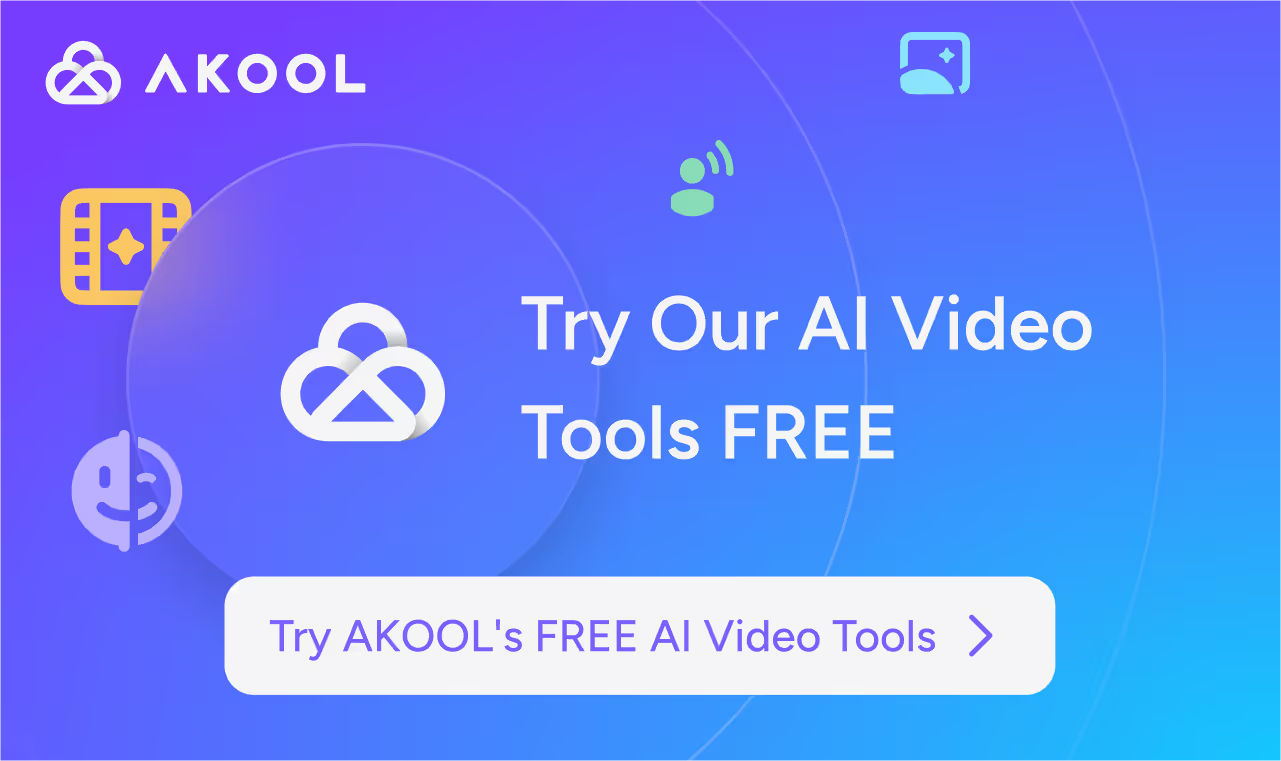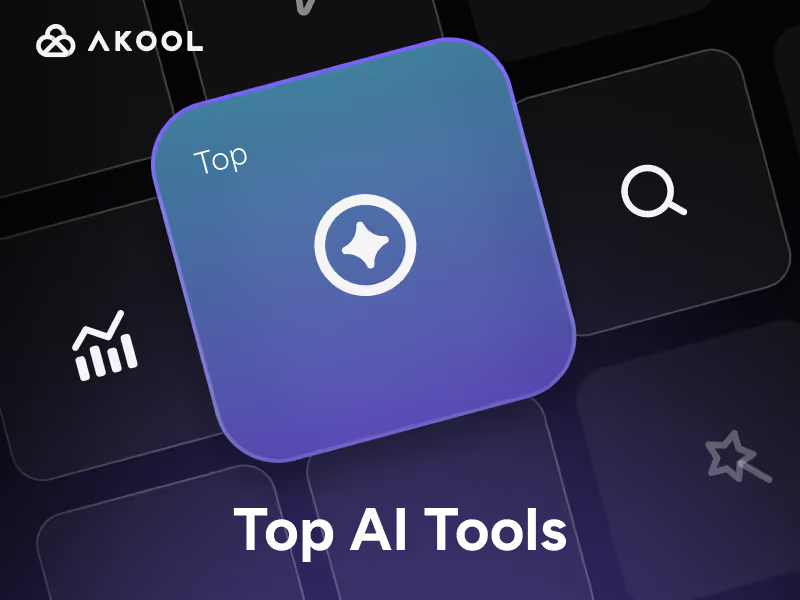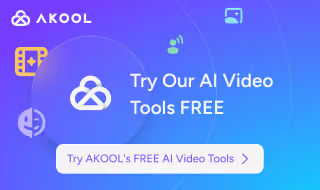AI video creation platforms are rapidly transforming how businesses, marketers, and creators produce high-quality, engaging content—no advanced editing skills required. With a surge of innovation and a crowded field of options, selecting the right solution can be daunting. From tools that let you turn text or images into videos to apps focused on streaming avatars, our side-by-side comparison of the top AI video creation platforms highlights unique features, pricing, and best use cases, weaving in user feedback and industry reviews. This guide will help enterprises, agencies, and ambitious creators make informed decisions in a fast-evolving landscape, whether you’re exploring a list of the best AI video makers or diving into advanced generative controls.
Akool: Best for Collaborative, High-Quality AI Video Creation
Akool is an advanced AI video creation platform tailored for businesses, agencies, and creators who demand both creative flexibility and workflow efficiency. If you’re researching the top 5 AI platforms to turn text or images into videos, you’ll find Akool’s combination of rapid rendering, granular prompt controls, and real-time collaboration hard to beat.
The platform’s 2025 updates include a storyboard-driven workflow for planning multi-scene projects, expanded template libraries, and enhanced collaborative editing. Team members can comment, co-edit, and manage assets in shared workspaces, while 4K export support and priority rendering on the Pro plan keep projects on schedule.
For a deeper look at how Akool compares with other AI video makers, check out our overview of the best AI video-maker tools and workflows. And if you’re curious about creating stunning branded videos from scratch, our guide to best list creating AI videos walks you through key techniques and tips.
Key Features:
- Text-to-Video & Image-to-Video with style and pacing controls
- Real-Time Collaboration in shared workspaces
- Extensive Template & Asset Library including stock media and voiceovers
Pricing:
- Free plan with limited exports
- Pro plan at $15/month with 4K exports and priority rendering
- Custom enterprise packages available
Pros:
- Fast, high-resolution renders
- Deep creative controls
- Team collaboration tools
Cons:
- Advanced features have a learning curve
- Basic avatar animation
- Credit-based free plan limits heavy use

Runway: Best for Advanced Creative Control and Experimental Video
Runway empowers filmmakers and creative pros to push AI video beyond templates. With its Gen-4 model supporting longer shot lengths and the unique Act One performance capture, you can prototype dynamic storyboards and transfer real actor movements to AI-generated characters. For a comparison of avatar-focused competitors, see our breakdown of top AI tools for video creation with streaming avatars.
Key Features:
- Cinematic text-to-video and image-to-video with camera controls
- Act One performance capture for character animation
- Full post-production suite: background removal, subtitles, slow-mo
Pricing:
- Free plan: 125 credits
- Standard: $15/month for 625 credits and watermark-free exports
Pros/Cons & Use Cases:
See above for detailed pros, cons, and ideal applications like short films, music videos, and social campaigns.
OpenAI Sora: Best for Cinematic AI Video from Simple Prompts
OpenAI Sora redefines accessibility in AI video generation, offering storyboard support and 1080p exports for ChatGPT Plus and Pro subscribers. Perfect for rapid prototyping and concept art, Sora’s output quality shines in short, cinematic clips. If you’re evaluating the best text-to-video AI solutions, our best-list–best-text-to-video AI roundup offers a handy starting point.
Adobe Firefly: Best for Enterprise-Ready, Legally Safe AI Video
Adobe Firefly brings AI video into the Creative Cloud fold with commercial-use–safe outputs and seamless integration with Premiere Pro and After Effects. With 1080p exports now available and 4K on the roadmap, Firefly is ideal for brands and agencies needing compliant, high-quality assets. For fast prototyping across multiple apps, you can also explore our list of must-try AI video generator apps.
Pika: Best for Social Media-Ready AI Video Creation
Pika zeroes in on social campaigns with built-in aspect ratio controls and creative presets. The latest Pika 2.2 release adds new morphing actions and flexible subscriptions, making it easy to whip up Instagram- or TikTok-optimized clips. If budget-friendly tools are a priority, our best list of free AI video makers can help you compare no-cost options.
Feature Comparison & Market Context
Across the landscape, you’ll find:
- Text-to-video and template workflows in all leading tools
- Collaboration strengths in Akool’s shared workspaces and Adobe’s CC integration
- Creative depth in Runway and cinematic polish in Sora
- Enterprise safety with Firefly’s licensed datasets
- Social optimization from Pika’s presets
Opportunities for differentiation:
- Akool excels at team-based, high-resolution workflows.
- Runway leads for experimental, filmmaker-grade builds.
- Sora focuses on quick, cinematic scene generation.
- Firefly guarantees legal compliance and Adobe synergy.
- Pika prioritizes speed and social-ready output.
As AI video creation evolves, platforms that balance power, collaboration, legal safety, and ease of use will best serve modern businesses and creators. Whether you’re scanning through the top AI video-maker lists or diving into advanced generative tools, choosing a solution aligned with your workflow needs will drive the greatest impact.
Frequently Asked Questions
How do AI video creation platforms differ from traditional video editing software?
AI video platforms automate much of the video creation process, allowing users to generate videos from text prompts or images. Traditional editors require manual editing and technical skills, while AI tools focus on speed, accessibility, and ease of use.
Can I use AI-generated videos for commercial purposes?
Some platforms, like Adobe Firefly, ensure all outputs are commercially safe and copyright-cleared. Others may have restrictions based on their training data, so always check each platform’s licensing and terms before using videos for business or marketing.
What are the main limitations of current AI video makers?
Common limitations include short video durations, limited lip-sync or character animation, and occasional output inconsistencies. Many platforms also require an internet connection and may have credit-based usage models that limit heavy use.
Do these platforms support team collaboration?
Some platforms, such as Akool, offer real-time collaboration features for teams, including shared workspaces and co-editing. Others focus on single-user workflows, so collaboration options vary by provider.
Is technical experience required to use AI video creation tools?
Most platforms are designed for accessibility, allowing users with little to no editing experience to create videos. However, advanced features on some platforms may have a learning curve for new users.






